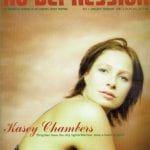Karl Shiflett & Big Country Show – That old time feeling
The Karl Shiflett & Big Country Show prove that the ancient tones Bill Monroe heard still float through the air in the 21st century, and that some of today’s bluegrass pickers still hear them.
Shiflett and his team of musicians aren’t mimicking something somebody else already did, memorizing old numbers they heard on scratchy 78s, or wearing vintage suits because retro is cool. They’re writing new songs and tunes, working in the same realm as the pioneers of bluegrass, inspired by the same living spirit of the music.
“What we’re doing is natural. We’re not trying to intentionally sound like somebody,” says Shiflett from his home in Groesbeck, Texas, a small town east of Waco. “We’re trying to keep bluegrass the way it originated, to keep the spirit alive.
“So many people started changing the music before it peaked out. A lot of people started changing the music completely instead of improving upon it. We think there’s still more work to be done with bluegrass without changing it.”
Eight of the tracks on In Full Color, the band’s second Rebel Records release, are originals. Tracks such as Lyle Meador’s haunting, Monroe-esque mandolin tune “The Old South” and banjo player Jake Jenkins’ lonesome “Cold, Cold Love” sound like they were written decades ago, rather than by guys who haven’t yet passed 30. Shiflett’s 21-year-old son, Kris, wrote “It’s Fall Again,” a beautiful song of surviving heartache through the seasons.
Shiflett and fiddle player Chuck Westerman are in their 40s, but Shiflett enjoys having younger players in the group. “I like seeing young people interested in bluegrass,” he says.
Meador, 26, from Alabama, has been with the band since 1997. Jenkins, 30, from Minerva, Texas, has been with Shiflett since the beginning of the Big Country Show in 1993. Kris Shiflett joined his dad’s band in 1996. The most recent recruit is 16-year-old dobro player Andy Ruff of southern Indiana, who’s contributing to the band’s next record.
There’s no hiding that Shiflett sounds like Lester Flatt, and he’s honest that Flatt’s showmanship is an inspiration to their live act. “All right, all right,” Shiflett says between songs onstage, smiling a big, toothy grin. The group performs around a single mike, housed in a vintage RCA ribbon shell with the letters KSBC. Down to each member’s black and white shoes, the band is dressed sharp with suits and vintage ties.
In October, the International Bluegrass Music Association selected the Karl Shiflett & Big Country Show as Emerging Artist of the Year, which in previous years has gone to progressive pickers such as Nickel Creek. “For the regular person off the street, we are more down-to-earth,” Shiflett suggests. “It’s familiar and reminds them of country music of the ’50s.”
That’s how the name “Big Country Show” came about. Shiflett wanted to recall the days when country and bluegrass music were played on the same radio stations. When Shiflett was 9, his family moved from East Texas to Groesbeck, where there is an old-time fiddle contest every year. “That was when I fell in love with the fiddle; it was the first time I heard that music live,” he says.
Shiflett played several instruments before choosing the guitar. By the time he was 13, he was playing the guitar and banjo, and he picked up the mandolin at 20. He performed with a few other bands, including the Sullivan Family gospel group, before starting his own ensemble.
For a long time, Shiflett wanted to capture the same sound of Big Country Show performances on a recording. For In Full Color, they used their vintage ribbon microphone, positioned in the same place for recording, with two additional mikes to capture a stereo sound and a third for additional bass if needed.
Shiflett looks for material that is timeless, whether it’s a band member’s original tune or comes from another source. His own songs deal with classic themes that are still relevant, as on “Since You’ve Gone Away” and “The Day I Met An Angel”.
“I try to write material that people can relate to,” he says. “If a songwriter sends me a song, I ask, ‘Is that the way I would express it?’ I’m the one singing it.”
Among the covers on In Full Color are “Now That You Have Me (You Don’t Want Me)”, written by Uncle Josh Graves and recorded by Lester Flatt and Mac Wiseman in the 1970s, and the spirited “Misery Loves Company”, a country song made popular by Porter Wagoner. They also recorded the tried-and-true “Down In The Willow Garden” — just because “I thought it should be redone and given a more traditional treatment than some of the other more recent versions I’ve heard,” Shiflett explains in the liner notes, It works, mainly because Shiflett had the guts to do it his way.
“I’m glad everybody’s not doing what I’m doing; I think it’s good that there’s different styles and approaches,” Shiflett says, acknowledging that bluegrass has evolved over the years. “We’re trying to bring back an era of bluegrass when the music was kind of raw, it had that feeling… Music is for the soul. There are so many people today who play millions of notes, but it doesn’t touch your heart.”




